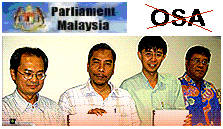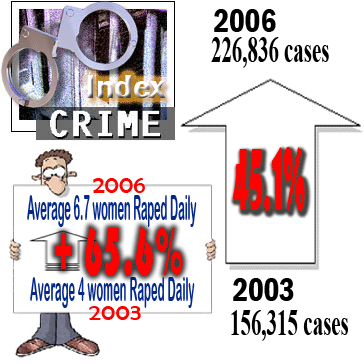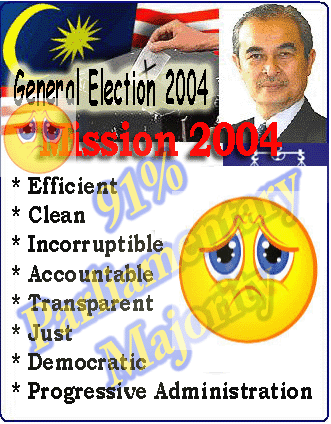Archive for March 22nd, 2007
Trend of greater official secrecy under Pak Lah government
Posted by Kit in Good Governance, Parliament on Thursday, 22 March 2007
The third front where I had hoped would be special mention of new policy initiatives in the Royal Address is in connection with Abdullah’s pledge to lead an open, accountable and transparent administration — in particular a firm government commitment to introduce a Freedom of Information Act to replace the Official Secrets Act (OSA) and the removal of the OSA and declassification of all privatization contracts, whether toll contracts, power and water concessions, to put them in the public domain for the scrutiny of the Malaysian public.
The Works Minister, Datuk Seri S. Samy Vellu was recently very incensed and hurt. He appeared on the front page of New Sunday Times (Feb. 25, 2007) with blaring headlines: “‘Works Minister, still smarting over being accused of ‘going for blood’, says… ‘I’m no Dracula'”.
Samy Vellu accused me of calling him a Dracula.
He said: “Lim Kit Siang said I was going for blood. He was indirectly saying I’m a Dracula. Only a Dracula goes for blood. A man and politician of his age and experience should be more cultured when he talks about other people.”
I said he was “bloodthirsty” and I stand by what I said. But I never said he is Dracula. If he is a Dracula, then it is his own self-description!

Let me state in this House that “Dracula” had never entered my mind when in my statement of 3rd February I had demanded to know why Samy Vellu was “suddenly so ‘bloodthirsty’ as to want four Opposition leaders, namely Tan Sri Khalid Ibrahim and Tian Chua of PKR, Ronnie Liu of DAP and Dr. Hatta Ramli (PAS) jailed for at least a year under the Official Secrets Act (OSA) for revealing that the government had guaranteed profits to Litrak in the Lebuhraya Damansara-Puchong (LDP) concession agreement?” Read the rest of this entry »
40 months as PM – Malaysians even more unsafe from crime
Posted by Kit in Parliament, Police on Thursday, 22 March 2007

The second front where I had hoped there new policy initiatives would be announced in the Royal Address is on police reform and in particular to establish the Independent Police Complaints and Misconduct Commission (IPCMC) with the announcement that the bill for its formation would be taken through all three readings in the current meeting of Parliament in view of the worsening crime index as well as repeated blows to public confidence in the ability of the police to implement the 125 recommendations of the Royal Police Commission to become an efficient, incorruptible, professional world-class police service to combat crime, uphold law and order and respect human rights.
The crime index in the country has worsened from 156,315 cases in 2003 to 226,836 cases in 2006 — a sharp rise of 45.1% in the past three years when the police force had set the target of reducing the crime index by five per cent each year!
In the past three years, violent crime had skyrocketed by 85.8 per cent from 22,790 cases in 2003 to 42,343 cases in 2006, with rape cases registering the highest increase of 65.5 per cent — reaching an average of 6.7 women raped daily in 2006 compared to an average of four women raped daily in 2003. In 2003, an average of 1.5 persons were murdered daily; but in 2006, this has increased to an average of 1.65 persons murdered daily.
I want to remind the Prime Minister of his pledge 40 months ago that one of his top priorities would be to reduce crime to restore to Malaysians their fundamental right to be free from crime and the fear of crime, whether in the streets, public places or the privacy of their homes? Today, Malaysians feel even more unsafe from crime than when he became Prime Minister.
Abdullah had been the Minister in charge of police for the past seven years and it is time he take full personal responsibility for the worsening crime situation in the country by providing personal leadership in the campaign to reduce crime — starting by ending all the procrastinations in the establishment of the IPCMC to create an efficient, incorruptible, professional and world-class Police Service. Read the rest of this entry »
Royal Commission of Inquiry on Corruption and ACA
Posted by Kit in Corruption, Parliament on Thursday, 22 March 2007
Some 40 months after Abdullah’s pledge to “walk the talk” to eradicate corruption, Malaysia is faced with the worst crisis of national integrity in the 40-year history of the Anti-Corruption Agency and 50-year history of the nation, with a spate of corruption scandals in the past two weeks, viz:
- Serious corruption allegations against the Anti-Corruption Agency director-general Datuk Zulkipli Mat Noor;
- Serious corruption allegations against the Deputy Internal Security Minister, Datuk Mohd Johari Baharun; in the Emergency Ordinance (EO) “freedom for sale” scandal; and
- Serious allegation by the Chief Justice, Tun Ahmad Fairuz Sheikh Abdul Halim of judges who accept bribes.
Internationally, Malaysia’s anti-corruption perception had been on a downward spiral ever since Abdullah’s takeover as Prime Minister.
Only last week, there was more bad news for Malaysia and Abdullah’s 40-month premiership.
The Hong Kong-based Political and Economic Risk Consultancy (PERC) 2007 corruption table in Asia, which is released every year based on a poll of expatriates working in Asia on their perceptions on corruption, is bad and grim news for all Malaysians concerned about national integrity, good governance and international competitiveness.
In a grading system with zero as the best possible score and 10 as the worst, Malaysia was ranked sixth in Asia with a score of 6.25 by PERC Corruption Asia 2007.
In 1996, Malaysia was ranked No. 4 with a score of 5, a reflection of the relentless deterioration of the corruption problem in the country over the years.
As the PERC annual corruption ranking is one of the polls used by Transparency International (TI) for its annual Corruption Perception Index (CPI), this is very bad news as the PERC 2007 Corruption Table is a forewarning that Malaysia is heading south towards No. 50 placing in TI CPI 2007 on the occasion of Malaysia’s 50th Merdeka anniversary this year. Read the rest of this entry »
Neither new policy initiative nor legislative programe for the new year
Posted by Kit in Corruption, Parliament on Thursday, 22 March 2007

As the third annual policy speech of the Abdullah premiership, the Royal Address is a disappointment as it offered neither new policy initiatives nor any legislative programme for the delivery of the Prime Minister’s pledges of an efficient, clean, incorruptible, accountable, transparent, just, democratic and progressive administration which is overdue by 40 months.
Last week, I had publicly urged the Prime Minister to come personally to Parliament on Question Time yesterday to answer the question asking him “to give a progress report on his reform pledges in the past 40 months, highlighting the reasons for the failures/shortfalls and how he could assure Malaysians disappointed that he had failed to ‘walk the talk’ on his reform agenda”.
This is because of the widespread and deep disappointments among Malaysians at the failure of the Prime Minister to live up to the high hopes of Malaysians to “walk the talk” to honour the pledges of reform agenda he had made when coming into office.
This question was “personal to holder” and could only be answered by the Prime Minister himself, as it concerns the pledges he had made when he became Prime Minister and during the 2004 general election for which he won an unprecedented 91% parliamentary majority. It could not be delegated to another Cabinet Minister, whether the Minister in the Prime Minister’s Department, Datuk Nazri Aziz or even the Deputy Prime Minister, Datuk Seri Najib Razak.
But this was not to be. Although Abdullah urged Barisan Nasional Backbenchers Club (BNBBC) members on Monday to perform “something extraordinary” to bring back the glory days of parliamentarians in line with the country’s 50th anniversary celebrations this year, no return of such “glory days” is conceivable firstly, when the Barisan Nasional has a suffocating 91% parliamentary majority and secondly, the Prime Minister stays away from Parliament even on questions directed at him personally.
I believe that the four previous Prime Ministers, from Tunku Abdul Rahman, Tun Razak, Tun Hussein Onn and Tun Dr. Mahathir Mohamad would not have stayed away from Parliament and delegated away the answer to such a “personal to holder” question.
The Prime Minister’s absence is most telling — for it is as good as an admission that he has very little to show to Parliament and the nation about honouring his reform pledges and agenda in the past 40 months — or he would not have allowed any other Minister to answer the question. Read the rest of this entry »
Abdullah govt’s anti-blog and anti-Internet Portals mindset/culture
Posted by Kit in IT, Parliament on Thursday, 22 March 2007

I know I am going against the grain of government thinking in asking Parliament to give serious attention to blogs by Malaysians, especially when the Internal Security Ministry has just warned the mainstream newspapers in the country against quoting and publishing “anti-government articles” from online portals and blogs.
The clarification by the Internal Security Ministry’s Publications Control and Al-Quran Texts Unit senior officer Che Din Yusof who sent out the warning to mainstream newspapers that his letter was a “request” and not a “directive” does not wash, when newspapers were also reminded that condition 11 of their publishing permit required them to “follow and not act against” such directives issued by the ministry.
Che Din has said that the Internal Security Ministry does not want the newspapers to get the people to believe everything that comes from blogs and the Internet portals.
Is it the business of the Internal Security Ministry to get the people to believe mainstream media and disbelieve blogs and Internet portals? Isn’t this a violation of the Bill of Guarantees proclaimed to the world by the Malaysian Government when launching the Multi-Media Super Corridor in 1996 — in trying to influence the mainstream media and the people at large to disbelieve blogs and Internet portals?
In fact, isn’t the government turning its back to the knowledge-based economy and the information and communication technology in adopting such an anti-blog and anti-Internet portals mindset and culture? Read the rest of this entry »
